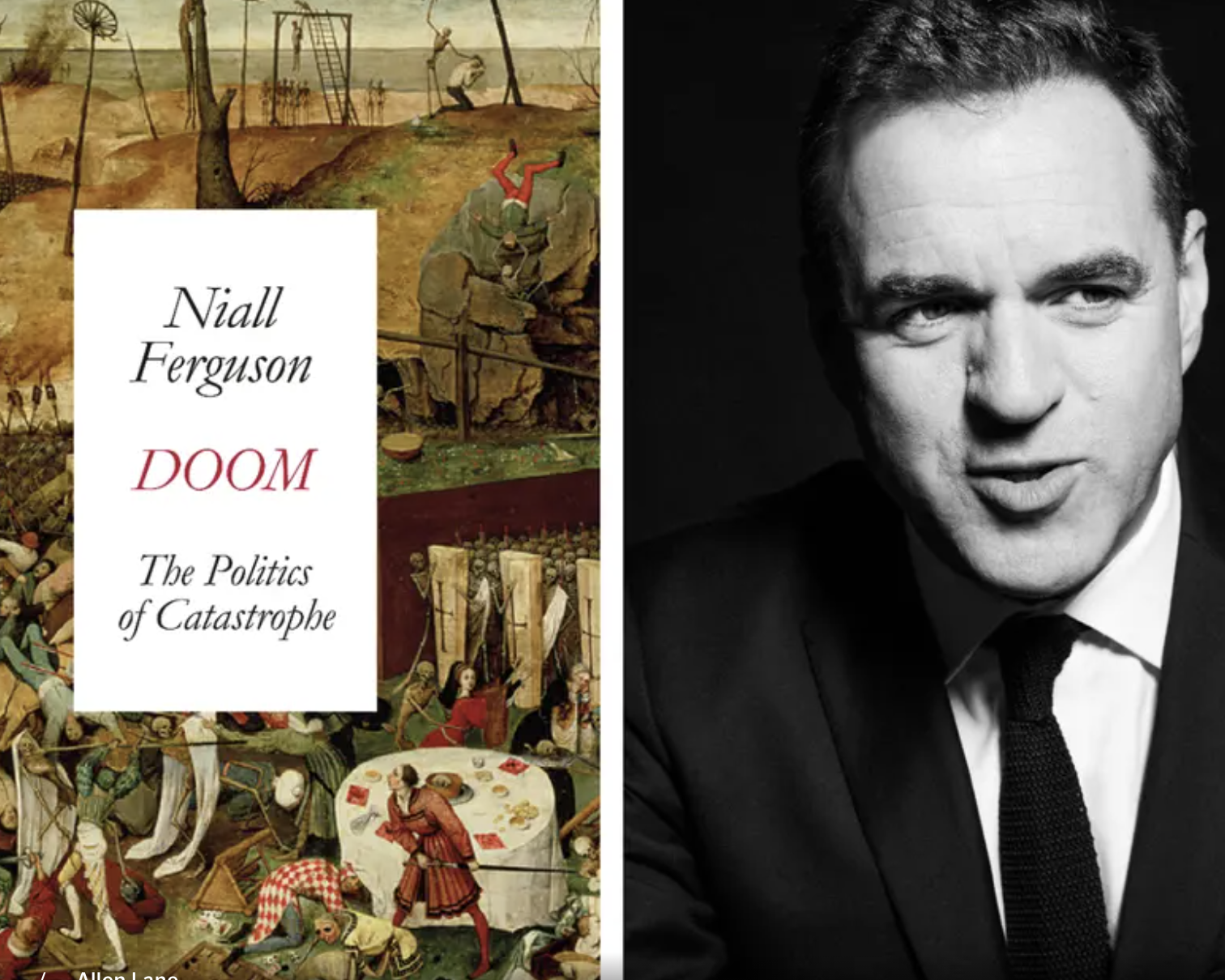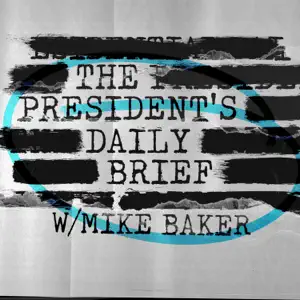
Doom: The Politics of Catastrophe by Niall Ferguson review
(Evening Standard) – From plagues and volcanic eruptions to the current Covid pandemic, mankind has always been faced with catastrophes.
Thought Leader: Niall Ferguson

This piece is by WWSG exclusive thought leader, Niall Ferguson.
I do not really understand why Tucker Carlson, one of the most talented broadcasters of the age, has decided to become an apologist for the fascist regime of Vladimir Putin. Having given Putin one of the softest interviews of his career in February, Carlson has gone on to feature the Russian foreign minister, Sergey Lavrov, and to give Jeffrey Sachs, the Columbia economist, two hours and six minutes to justify the invasion of Ukraine, amongst other things.
Sachs and I have a history. Back in 2011, we clashed on Fareed Zakaria’s show shortly after Sachs had given his backing to the Occupy Wall Street movement, just one episode in his long, leftward repositioning of himself. Having once been the proponent and indeed architect of free-market reforms in post-Communist Russia, Sachs (like the equally insufferable Paul Krugman) had by the Obama era realigned himself with the opponents of classical liberalism, blaming everything from the global financial crisis to climate change and income inequality on Republican presidents, beginning with Ronald Reagan.
Today, as Director of the Center for Sustainable Development at Columbia’s Earth Institute, Sachs is typical of the academic authoritarians who would readily submit the world to the rule of the Chinese Communist Party so that the problem of global warming could really be solved—you know, the way Covid-19 was solved. Those of us who see the CCP as the principal cause of both Covid and rising CO2 emissions struggle to understand Sachs’s motivations. I once listened to him deliver a speech at a conference in Beijing which blamed nearly all the world’s ills on the United States. Forgive me, but I just don’t think citizens of a democracy—least of all professors who supposedly enjoy the privileges of academic freedom—should run down their own country when they are visiting autocratic regimes. I wasn’t entirely surprised when, in 2018, Sachs took Huawei’s side in the tech war, writing that “the Trump administration, not Huawei or China, is today’s greatest threat to the international rule of law, and therefore to global peace,” and then quitting Twitter when critics impugned his motives. Last year, he gave the keynote at the Huawei Sustainability Forum.
Along with standard leftist diatribes against Israel, Sachs’s interview with Carlson serves up the familiar pro-Kremlin propaganda about Ukraine. Yes, that’s right, Putin was provoked into invading Ukraine by the cynical expansionist policies of successive U.S. governments from Clinton to Biden (those notorious neocons), the sole goal of which was to “run the world,” to be “the hegemon … the sole superpower.” Naïve listener, you thought the expansion of the North Atlantic Treaty Organization (NATO) was to confer on the previous victims of Tsarist and Soviet imperialism the same protection it had afforded West European countries (and Turkey) since the early Cold War. No!
“We told Gorbachev and we told Yeltsin we weren’t going to expand [NATO] at all,” but we went ahead and did it because … world domination! The Russians, poor innocent things, “just wanted to cooperate.” Sachs has been writing and broadcasting in this vein for nearly three years now, even agreeing to appear (on September 3, 2023) on Vladimir Solovyov’s odious Russian TV show. The Carlson interview reveals that Sachs has learned nothing from the searing open letter addressed to him in March 2023 and signed by 340 scholars.
To get a sense of the intellectual provenance of Sachs’s line of reasoning, try replacing “Putin” with “Saddam” and “Ukraine” with “Kuwait.” The Iraqis wanted to cooperate in 1990, but the Americans were determined to control the Middle East. Or how about with “Hitler” and “Poland”? The Germans wanted to cooperate in 1939, but the British were determined to control Europe. That, of course, was the argument served up on another Carlson podcast by the pseudo-historian Darryl Cooper.
Sachs: “Putin was completely pro Europe.” Yes, Jeff, just the way Saddam was pro Gulf oil and Hitler was pro Lebensraum.
Sachs: “The point of that [intervening in the wars in the former Yugoslavia] was to break Serbia in two, create a new state, Kosovo, where we have the largest NATO military base in southeast Europe. … It wasn’t to save the oppressed Muslim population. It was very much to save the military industrial complex, to have a nice location in southeastern Europe.” Yes, Jeff, just like the point of going to war in 1939 was to make sure British troops could be stationed in western Germany for the rest of the century. Nothing to do with treaty commitments, or with stopping the Germans from massacring millions of people.
Sachs: In 2004 “we [were] surrounding Russia. … In 2007, President Putin gave a very clear speech at the Munich security conference, very powerful, very correct, very frustrated, where he said, gentlemen, you told us in 1990 NATO would never enlarge.” Yes, Jeff, but that’s not all Putin said in his implicitly threatening speech, because I was there and we can all check the text. How about the passages when he committed himself to adhere to international law and the nuclear non-proliferation regime? Putin: “The use of force can only be considered legitimate if the decision is sanctioned by the UN.” Remind me when he got that sanction in 2022?
And on Sachs goes, increasingly reminding me of Great Uncle Alfred, a card-carrying Communist who derived a perverse pleasure from reciting Kremlin talking points during Christmas dinner. The United States “conspired with the Ukrainian right to overthrow” Viktor Yanukovych because he wanted to keep Ukraine neutral and out of NATO. Yes, Jeff, that’s why the revolution against his egregiously corrupt regime was called “Natomaidan.” Except that it was called “Euromaidan,” because that was the real issue in 2013-14. And no, it wasn’t a CIA coup. I know because, unlike you, I went to Ukraine in those years.
In Sachs’s Through-the-Looking-Glass version of events, Putin didn’t annex Crimea and create puppet regimes in Luhansk and Donetsk. “They organized this referendum. This is a Russian region and there’s an overwhelming support: We’ll stay with Russia. Thank you. Not with this new post-coup government. An outbreak breaks out in the eastern provinces, which are the ethnic Russian provinces, in the Donbas, in Luhansk and Donetsk …” It’s amazing how outbreaks just, you know, break out in Donbas, whereas the CIA is in full control of the revolution in Kyiv.
The best-worst moment is when Sachs argues that we should have disbanded NATO after the dissolution of the Soviet Union. Because there’s no longer a Russian threat to Europe, is there? Only an American threat, the dastardly plan of “the neocons” to achieve world domination. U.S. troops in Germany today are, in reality, an army of occupation. The Ukrainians who have died since the Russian invasion—Sachs estimates a death toll of 500,000—were not killed by Russia but, he seems to imply, by the United States.
Let’s come back to the real world and remind ourselves of the realities of post-Soviet Russia. In the 1990s, even before Putin’s rise, Russia was showcasing its humanitarianism with a decade-long campaign to crush Chechnya. Already some of us were worrying what would come after the “Weimar Russia” of the Yeltsin years. After Putin came to power, he swiftly shut down the independent media, curbed the authority of the Duma, and put former KGB agents like himself in charge of every important institution (the state oil company, multiple provincial governorships, and so on). Putin has crushed dissent at home and would dearly love to crush it abroad—which is precisely why so many countries have sought to the protection of NATO, most recently Finland and Sweden.
Of course, liberal professors blaming all the wars in the world on American imperialism is about as traditional as Thanksgiving turkey. Sachs: “I’m old enough to remember Vietnam. I’m old enough to remember trying to overthrow Bashar al Assad. … I’m old enough to remember Libya. I’m old enough to remember Afghanistan. We screw up nonstop.” I used to go to Mother Jones and The Nation when I wanted this kind of crap. But this is the first time I’ve heard it just after a commercial like this:
The headlines remind us daily, the world is a dangerous place. The elites in charge say everything’s fine, stop noticing. But you know better, and your gut knows that time is short to prepare for a world that is four missed meals away from chaos. MyPatriotSupply has helped over 3 million families become more self-reliant and is the company Americans trust to prepare. Go to mypatriotsupply.com and secure their best-selling three-month emergency food kits.
Not sure who exactly might be going to make such emergency rations necessary, but hey, you have to hand it to Tucker for hosting the only podcast where the Columbia professors get to share airtime with scams aimed at preppers.
“But the noise of these petty wars and commotions was quite sunk in the tumult of the crusades, which now engrossed the attention of Europe, and have ever since engaged the curiosity of mankind, as the most signal and most durable monument of human folly that has yet appeared in any age or nation.”
Now that’s what I call an opening sentence! It’s from chapter V of the first (though not the first-published) volume of my new favorite book, David Hume’s The History of England. Despite my devotion to the ideas of the Scottish Enlightenment, I had never read this masterpiece, wrongly believing that Hume’s most important contributions were philosophical rather than historical. Preparing to deliver the Dallachy Lecture at my alma mater, the Glasgow Academy, I resolved to delve into Hume’s History. It is priceless—the ultimate vaccine against the Whig interpretation of history.
As ironical as Gibbon in The Decline and Fall, Hume also writes with a sardonic voice that seems to emanate from an Edinburgh dining room circa 1760, when the claret is being passed round for the third time. With a characteristic flourish, as the climax approaches of Henry II’s struggle with Thomas à Becket, Hume throws in a footnote:
This conduct appears violent and arbitrary, but was suitable to the strain of administration in those days. His father Geoffrey, though represented as a mild prince, set him an example of much greater violence. When Geoffrey was master of Normandy, the chapter of sees presumed, without his consent, to proceed to the election of a bishop; upon which be ordered all of them, with the bishop elect, to be castrated, and made all their testicles be brought him in a platter.
You will not easily banish that image from your imagination.
I told Bari Weiss and Nellie Bowles last week that the history of our times will require a Hume to do it full justice. For—if I may be allowed a metaphor—a week seldom passes without someone like Jeff Sachs serving up a platter of bollocks.
The males of the Ferguson family are discouraged from weeping—or “greeting,” the contemptuous Scots term that I grew up hearing in Glasgow. I patiently explained this to my youngest, Campbell (7), who was under the weather this week with a streaming cold, a bleeding nose, and an ear infection, poor lad. Once his mother had administered the indispensable Calpol, without which parenting in England would be miserably hard work, I advised him to watch Arsenal highlights—specifically, our team’s splendid midweek victory over Crystal Palace. This worked.
I make one exception to the nae-greetin’ rule and that is live opera, which routinely reduces me to helpless tears. Last week, I took a contingent of the clan to see La Bohème at the Royal Opera. This superb production of Puccini’s heartbreaking depiction of love in the time of tuberculosis had me greeting my eyes out within minutes of Olga Kulchynska’s entrance as Mimì. The diminutive Ukrainian soprano sang with such exquisite pathos that I was almost inconsolable by the interval.
Doom: The Politics of Catastrophe by Niall Ferguson review
(Evening Standard) – From plagues and volcanic eruptions to the current Covid pandemic, mankind has always been faced with catastrophes.
Thought Leader: Niall Ferguson
Michael Baker: Ukraine’s Faltering Front, Polish Sabotage Foiled, & Trump vs. Kamala
In this episode of The President’s Daily Brief with Mike Baker: We examine Russia’s ongoing push in eastern Ukraine. While Ukrainian forces continue their offensive…
Thought Leader: Mike Baker
Peter Zeihan: What Does the Future Hold for Taiwan and Semiconductors?
From Peter Zeihan: Taiwan has positioned itself as the dominant player in the semiconductor industry, but what would happen if a conflict with China broke…
Thought Leader: Peter Zeihan

